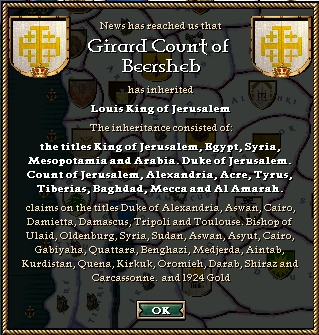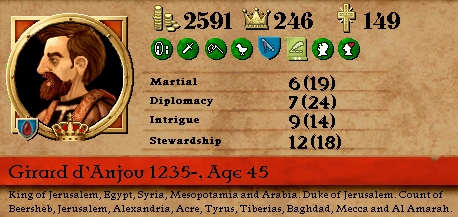Part 8: VIII. Louis I 1265-1280 A.D.
Oh, Lordy, things got a bit out of control this time…
The Mongols can be a tough nut. When I first bought Crusader Kings, ages ago, one of my first games was not too different from this one. I started in 1066 as an English Count and ended up carving out the Kingdom of Jerusalem. The Mongols were even rougher back then, especially on hard. The Golden Horde had pushed into France by 1240. Around the same time the Il-Khanate showed up. In less then a decade they had swept through Persia, crushed Jerusalem, rolled through my Egyptian holdings, and left me as a tiny outpost on Cyprus. I watched, over the next couple decades as the Golden Horde overran Italy and Spain and the Il-Khanate flooded westward to the Atlantic coast of Africa.
They've been tweaked a bit since then, but you still get reports now and then about games like that on the official Paradox forums. It's one of the reasons I specifically did NOT play on hard.
You see, the Mongols are like the Borg. For starters, they don't suffer attrition. Attrition is a big factor. Right now, my Alexandria garrison is just over 20,000 men. But by the time I've marched five or six provinces at least 6,000-7,000 of them will be dead from attrition. The Mongols on the other hand get multiple random, free spawns of 10,000 troops that could stand on Mount Everest, in December, during a blizzard, and never suffer a single casualty. They can stack up a dozen of these massive divisions and attack your provinces, and even if you would somehow win by superior leadership and technology, if the fight drags on to the end of the month, the provincial attrition calculation takes ALL troops in the province into effect and applies the attrition solely to your troops, `cause the Mongols are immune. That means your entire, winning army will instantly starve to death.
Furthermore, they can have a functionally infinite personal demesne. They never need to hand out any provinces to Counts or Dukes. They get to coordinate all those armies themselves, nor can they go bankrupt. They eventually declare war on pretty much everyone they border and if they conquer a province they don't have to make a peace settlement to get it, instead it's instantly transferred to their own lands.
Basically, if the Mongols get too big they're unstoppable. They're able to recruit the native populations from their vast holding who then function as attrition free super-Mongols to conquer more provinces and pick up their soldiers too…
So, you can understand I was little worried about the legacy of King Baldwin, Mad Charles and all their sundry family.
Thus my delight when I saw, late in the year 1268, that the territory of the Il-Khanate was fractured by a bunch of red lines.
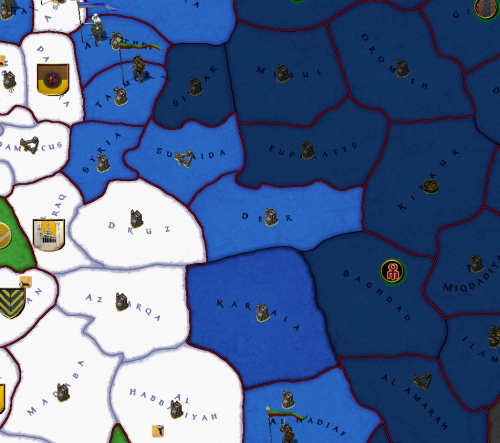
They don't show up real great in that shot, but they're there. That means that they got one of the events designed to pull the rug out from under the Mongols a bit. I think it's called 'Trouble back in the Homeland' or something like that. It switches the Mongols inheritance to Salic Gavelkind and kills off their leader.
So, what's that mean? Well, Salic Gavelkind and Semi-Salic Gavelkind are two forms of inheritance that you NEVER EVER WANT TO USE UNDER ANY CIRCUMSTANCE. If you're using one of these, then, when your King dies, your lands and titles are split up amongst your children. One might become King of Jerusalem, another would become King of Egypt, and so forth.
The Il-Khanate Khan had apparently had half a dozen or so (the Mongols are prolific) kids, most of whom were still under age. This was very, very good. For starters, most of the Magical Mongol Powers are tied to the tag. The Il-Khanate and Golden Horde get them, their little fractured spin-off states don't.
Although the Il-Khanate had not yet devolved into outright civil war, within a few months King Louis had decided that there would be no better time to strike. The ruling Khan still held ten or twelve territories, but most of them were deep in Persia or up behind the Caspian sea. The Khan did, however, hold a clump of land around their temporary capital in Baghdad and another on the northern border of the Kingdom of Jerusalem.
King Louis aimed to take these territories from the Khan. That would put the Khan's main power base quite some distance away and leave the Kingdom bordering only squabbling and quarrelsome vassal Khanates.
In June of 1269, as the armies of the Kingdom were moving into position one of the smaller sub-Khanates broke away from the rule of the Il-Khanate. Great news, as it was one more war the central Khan had to contend with.
On the 9th of July of the year 1269, King Louis gave a rousing speech to his troops, stationed out in the deserts of Syria. Unlike the Pope, he could not call a Crusade, but this was still a Holy War. A war to defend the Holy Land and the site of Christ's Crusifixtion from the pagan Horde.
The next day the armies of the Kingdom of Christ on Earth stormed eastward, in the land of the Mongols.
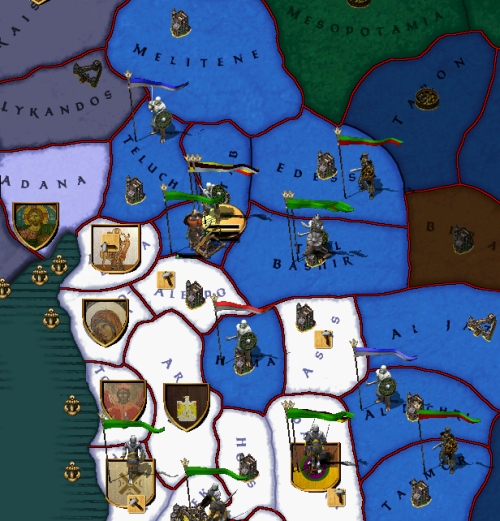
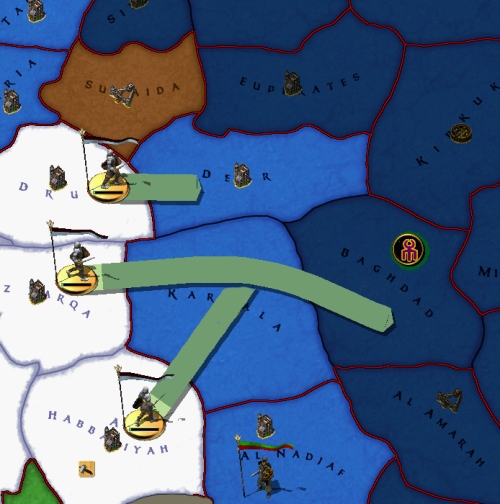
In the north, around Aleppo, the Mongols resisted fiercely, but most of their troops had left the Baghdad region, and the armies of the Kingdom moved quickly toward the city.
King Louis had not intended this to be a vast or long war. He was primarily using troops from his personal demesne, with a scattering drawn from a couple of his most loyal vassals. His hope was that the factious sub-Khans, many of whom were fairly disloyal, would not be very motivated to jump to their lieges defense, letting the Kingdom of Jerusalem pick off the rich, nearby territories of the Head Khan and make an advantageous peace.
What King Louis hadn't counted on was the fervent enthusiasim of his own vassals. Within a week of the war starting he had received news that his vassals had declared war on some of the smaller, sub-Khans and were marching en-masse, while singing hymns, into the Mongol holdings.
He could not quite believe the reports that almost all his vassals had, indenpendently, mobilized nearly all their troops, left the homeland undefended and were sweeping the disorganized Mongols before them. It was a blessing. It was a miracle. It was the Will of God.
In October of 1269, Baghdad fell to King Louis' personal army. He had also gained enough territory that he was crowned King of Syria. It was a short and hurried ceremony, but still important.
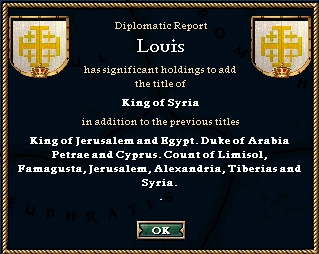
One thing I noticed was that Baghdad, along with may of the other provinces I took from the Mongols had lost all their improvements, except perhaps for a road and fort. I'm not sure if the Mongols get a 'Burn It All' event or if they were just spammed with the standard 'You're Bankrupt, Lose a Building' event because of their massive armies.
In any case, when King Louis rode into the wasteland of Baghdad he was shocked at the devastation. The city, once renowned for it's wealth and beauty had been burned and gutted.
Bizarely, during the Kingdoms fight for it's very existence several of his younger sons came to him with a demand.
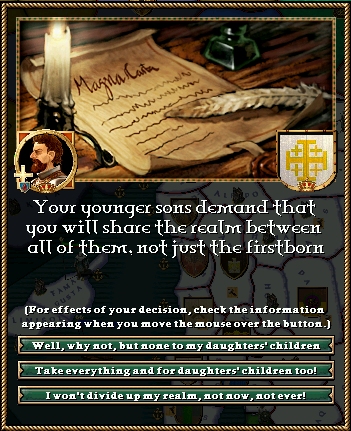
If he accepted it, King Louis' Kingdom would go to a form of Gavelkind which, as we already discussed, was a big No-No. He explained to his sons that, no, he would never divide the Kingdom between them. That would surely be madness, to fracture the Kingdom into several independent holdings. Couldn't they see what such infighting and division had done to the fearsome Mongols? Jerusalem would stay one Kingdom.
His peace envoys to the Mongols were sent back, without their heads, so King Louis reluctantly decided to continue the war, moving against several of the smaller Khanates himself. Amazingly, the Mongols seemed to be a paper tiger. Every province the Kingdom took was instantly folded into the Kingdom (just like the Mongols do to everyone else) and though there was resistance, it was scattered and weak.
In the hot, sweltering summer of 1271 King Louis conquered Basra and stood, at last, on the shores of the Persian Gulf. Had any Christian army, he wondered, ever conquered, so quickly, so vast a territory? News had come that one of his vassals, (whose armies he could not control in-game) had already pushed past him and were moving into southern Persia. It seemed unreal, a dream. But perhaps this was what Christ had meant when He said that Faith could move mountains. King Louis knelt in the surf of the Persian Gulf and offered up a prayer to the Savior of mankind. He felt his heart lift and his soul soar.
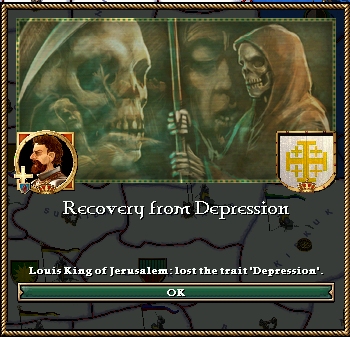
Shortly afterward, he crowned himself King of Mesopotamia. He had not asked for this Glory, but God it seemed had plans for him. He reflected, briefly, on the poor Bastard King, Archambaut. Surely, he would not have led the Kingdom east in such a way? Thus, God's Hand had removed him.
Finally, early in 1272, the Khan of the Il-Khanate sent envoys requesting peace, and King Louis agreed. The truth was, he probably could have pushed right on forward and conquered all of Persia too, but had already taken so much he worried how well the Kingdom could absorb such conquests.
I had honestly, honestly only hoped to take a few provinces from the Il-Khanate, but the collapse event must have hit them harder then I thought. They just melted away and my vassals just ran amok. It was crazy.
Yet, almost as soon as the treaty had been signed, King Louis felt God calling him. The tattered remnants of the Caliphate that had once been Saladin's Egypt still held the stretch of desert down the Arabian coast to Mecca. Their leaders had fled to Gibraltar, of all places, on the other end of Europe, yet still claimed the lands as their own. One last campaign, Louis told himself, one last campaign and then I will rest.
The weak local Emirates were no match for Kingdom armies honed against the Mongols.
In July of 1273, King Louis marched into the burning rubble of Mecca holding a great, golden Cross. The most holy of strongholds of the infidels had fallen with the barest of struggles. It was clear, at last, to the world that the great tide of Islam that had swept forth centuries before was now in retreat. It was the Cross that loomed over Mecca now.
There within the Kaaba, the Crusaders found a black stone, held together by silver wire. It was said the Muslims kissed this stone on their pilgrimages to Mecca. The stone was smashed as an idol by a small group of Templars, and the peaces thrown into the sea. It was said however, that one fragment was taken to Rome for the Pope and another fragment to the archives of the Palace in Jerusalem.
The Kaaba and its Mosque were rededicated as the Cathedral of St. John the Baptist and there Louis was crowned King of Arabia.
From that day forth, history knew him only as Louis the Great.
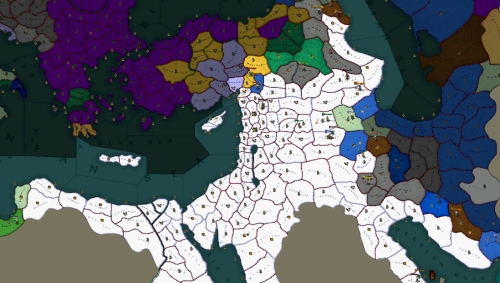
The insane expansion of the Kingdom of Jerusalem by 1273. Much of that territory was conquered by my vassals who enthusiastically rushed ahead, grabbing the land for themselves I might add. Coastal Dukes of Antioch and such now rule distant holdings as far away as the Caspian sea.

Thankful to God for having made him the vessel of his Will on Earth, King Louis the Great dedicated himself to serving God more fully, swearing off all contact with women. It was odd to think that God had, perhaps, planned the betrayal of his last wife, Alais on purpose, to teach him humility and the proper place of such things. Thus, King Louis turned his back on Original Sin.
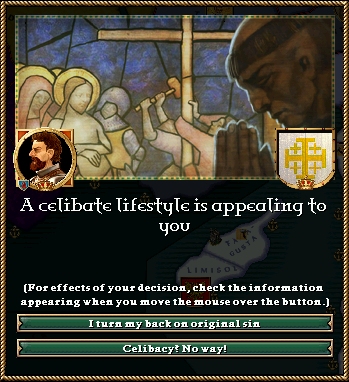
The vast and glorious conquest of King Louis the Great did not go unnoticed. In September of 1274 the Pope himself came to Jerusalem. There he crowned Louis as Emperor of Jerusalem, with the blessing of the Holy Church.
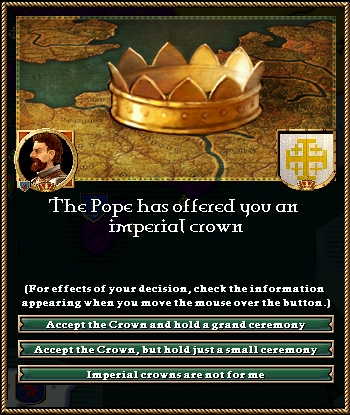

(I guess this has an average time to happen of about 15 years, but Louis has continuously been Papal Controller for a while, so that might have sped things up.)
But God's Will is inscruitable. He giveth with one hand and taketh away with the other. Just weeks after the ceremony news came that Jacque, Emperor Louis' eldest son and heir to the Imperial Throne of Jerusalem, had sickened and died of an intestinal parrisite. Not, perhaps, the most distinguished way for an Imperial Heir to die. But Louis could not question God's plan. He could only bow his head and sadly whisper, "Thy will be done, on Earth as it is in Heaven."
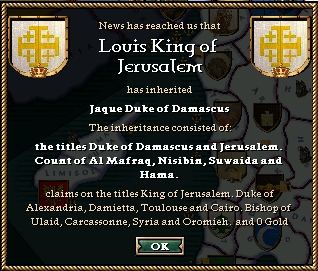
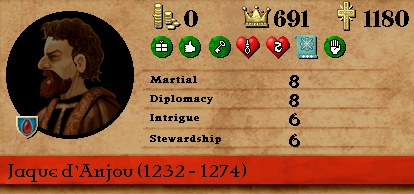
Jacque's younger brother, Girard was now heir to the throne.
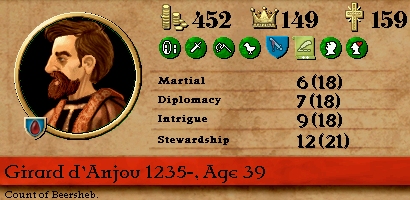
Girard was not well regarded. The blue trait with the bloody sword means he is a kinslayer. At some point he has successfully killed a close relative. He's only had one wife, so perhaps it was his dead, bastard son who didn't even survive a year. God only knows. But if Girard becomes King it will make things more difficult with his vassals. No one loves a man who murders his own flesh and blood. Also, although Girard has half a dozen natural children, they're all daughters, so the Throne is scarcely more secure then it was before.
Meanwhile, the conquered territories are restive. Despite being burned and despoiled by the Mongols the natives do not appreciate the heavy handed Catholicism of the Empire of Jerusalem. Baghdad, in particular, spawns many large multi-thousand soldier armies of rebels who take a fair amount of cash and time to suppress. A couple times they even defeat the too small armies sent to relieve the city.
Mecca also is rebellious, but with less population then Baghdad and a certain amount of religious cleansing during the conquest it does not cause as many problems as Baghdad.
Elated by news of the Empire of Jerusalem's conquests, countless more European immigrants arrive in the Holy Land, to be part of God's Kingdom and near the Holy Land. Many of these settlers head to the rich city of Alexandria, enough so that it becomes far more of a Crusader city then an Arabic one. Perhaps this was appropriate. Once, Alexandria had been a Greek city, then a Roman one, the Christian, then Arab, an now Christian again.
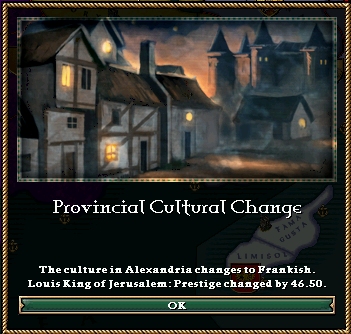
In 1276 the Duchy of Tripoli started a war with the Sultanate of Rum, the Turks who ruled central Anatolia, north of Jerusalem and east of the Byzantines. Emperor Louis assisted his vassal but, not having the heart for a long campaign, only sent a few troops who made little progress.
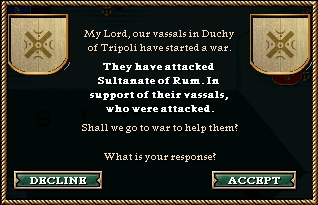
It was, perhaps, no surprising news, in 1277 that after half a dozen religious revolts the Muslim population in Mecca had dropped to next to nothing. It was populated primarily by Templar soldiers and a few hardy, enthusiastic settlers. It had become, in large part, a Catholic city.
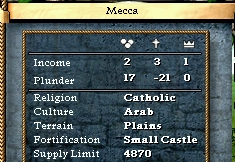
What was surprising was, that almost immediately afterward, enough natives in Baghdad converted to make that city a majority Catholic one. Perhaps they had lost heart after so many failed revolts or perhaps the loss of Mecca had struck them deeply. It was commonly regarded as a miracle.
Here's a religious map of the Empire in 1277, just before the conversion of Baghdad. Brown is Orthodox Christianity, white is Catholicism, and green is Islamic. You can see most of our provinces are along the coasts, and Christianity is catching on quite well in Egypt. You can just make out Mecca down at the bottom. You don't really have much control over religious spread, just praying and waiting, so I'm rather startled that both Baghdad and Mecca converted so quickly. Part of the reason of course is that I've kept them in my personal domain, so that when religious revolts come up I can 'roll the dice' for a conversion chance and much worse rebellions, which I don't think the AI Dukes and Counts are so willing to do.
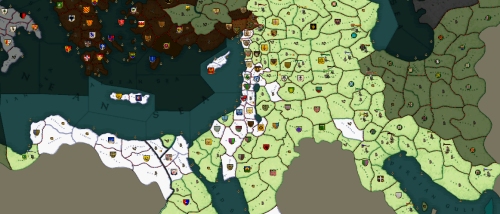
In October of 1277, Emperor Louis decided to make peace with the Sultanate of Rum. His expeditionary forces had been pushed back, and he had neither the funds nor the will to rouse the Empire over such a minor struggle.
In 1279, one of Emperor Louis' younger sons, Guiges, begs for land, and Louis grants him a parcel of land and the Dukedom of Baghdad.
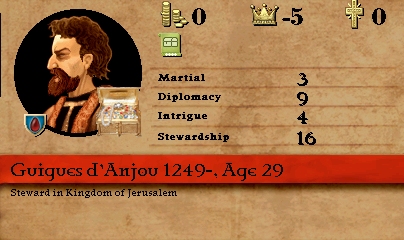

Little did Emperor Louis know, when he watched his smiling son ride off that day, that he had, unwittingly, signed the boys death warrant. Beaten down though they were, the soldiers of Islam would yet have some small revenge on the family of Louis the Great. So, it was, perhaps, fortunate then that Emperor Louis would not live to see yet another of his sons die, this one a most horrible and painful death.
Louis had been born in 1215, in a far different world. One where the Kingdom of Jerusalem had been a thin strip along the coast of the Holy Land and Egypt, surrounded on all sides by fierce enemies. In 1280, at the age of 65, he left it one of the most powerful Empires in Europe, the hope and light of the Christian world. He could only hope that his murderous son would not undo all he had worked for…
Rest in Peace, Louis d'Anjou. Rest in Peace.
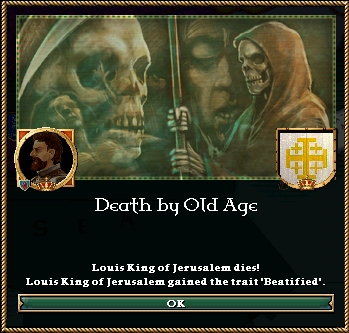
Long live Emperor Girard! Long live the Emperor!
